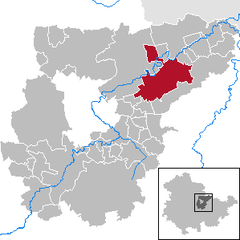Apolda
- Machine translation, like DeepL or Google Translate, is a useful starting point for translations, but translators must revise errors as necessary and confirm that the translation is accurate, rather than simply copy-pasting machine-translated text into the English Wikipedia.
- Do not translate text that appears unreliable or low-quality. If possible, verify the text with references provided in the foreign-language article.
- You must provide copyright attribution in the edit summary accompanying your translation by providing an interlanguage link to the source of your translation. A model attribution edit summary is
Content in this edit is translated from the existing German Wikipedia article at [[:de:Apolda]]; see its history for attribution. - You may also add the template
{{Translated|de|Apolda}}to the talk page. - For more guidance, see Wikipedia:Translation.


Apolda (German: [aˈpɔlda] ⓘ) is a town in central Thuringia, Germany, the capital of the Weimarer Land district. It is situated in the center of the triangle Weimar–Jena–Naumburg near the river Ilm, c. 15 kilometres (9 miles) east by north from Weimar. Apolda station lies on the Halle–Bebra railway, which is part of the main line from Berlin to Frankfurt.
History
Apolda was first mentioned in 1119. Until 1633 it was seat of a family of nobles, the Vitzthums, which acted relatively independent. Between 1633 and World War I Apolda was property of the University of Jena. Nevertheless, from 1691 to 1809 Apolda was part of the Duchy of Saxe-Weimar and from 1809 to 1918 of Saxe-Weimar-Eisenach (after 1815 Grand Duchy). Around 1700, the knitting industry began to grow, so that finally, at the end of the 19th century, Apolda was the wealthiest town of the whole region. On July 12–17, 1945, Apolda issued a set of three of its own postage stamps. They depicted a new sprig growing up out of a tree stump. After World War II, Thuringia became part of the German Democratic Republic. Up to German reunification, Apolda still was famous for its textile industries. Since then, a notable economic decay has taken place.
Mayors
Ernst Stegmann was the long-time mayor of Apolda with 33 years in office (1901-1934).
| |
|
|
|
Main sights
It possesses several churches and monuments to the Dobermann Pinscher dog breed, which was created in Apolda, and to Christian Zimmermann (1759–1842), who, by introducing the hosiery and cloth manufacture, made Apolda one of the most important places in Germany in these branches of industry. By 1900 it also had had extensive dyeworks, bell foundries, and manufactures of steam engines, boilers,[3] cars and bicycles. After German reunification the majority of these had to be closed down for economical reasons.
The most important sights are:
- St. Martin's Church (1119), details in Romanesque, Gothic and Baroque style
- Town Hall (1558/9), in Renaissance style
- Castle (16th/17th century)
- Railway viaduct (1845/46)
- Zimmermann factory building (1880–1882)
- Lutherkirche (1894)
- St. Boniface's Church (1894)
- Glocken museum (Bell museum)
The largest free hanging bell in the world, the Decke Pitter of Cologne Cathedral, was made in Apolda. Apolda also has mineral springs.
Twin towns – sister cities
 Mark, Sweden
Mark, Sweden Rapid City, United States
Rapid City, United States San Miniato, Italy
San Miniato, Italy Seclin, France
Seclin, France
Notable people
- Karl Friedrich Louis Dobermann (1834–1894), first breeder of the Doberman Pinscher
- Otto Franz Georg Schilling (1911–1973), mathematician
- Albert Raisner (1922–2011), musician and TV host
- Klaus Agthe (born 1930), businessman and author
- Mike Mohring (born 1971), politician (CDU)
- Erich Seidel (ophthalmologist), ophthalmologist known for Seidel test and Seidel sign
See also
References

- ^ Gewählte Bürgermeister - aktuelle Landesübersicht, Freistaat Thüringen, accessed 14 July 2021.
- ^ "Bevölkerung der Gemeinden, erfüllenden Gemeinden und Verwaltungsgemeinschaften in Thüringen Gebietsstand: 31.12.2022" (in German). Thüringer Landesamt für Statistik. June 2023.
- ^
 One or more of the preceding sentences incorporates text from a publication now in the public domain: Chisholm, Hugh, ed. (1911). "Apolda". Encyclopædia Britannica. Vol. 2 (11th ed.). Cambridge University Press. p. 183.
One or more of the preceding sentences incorporates text from a publication now in the public domain: Chisholm, Hugh, ed. (1911). "Apolda". Encyclopædia Britannica. Vol. 2 (11th ed.). Cambridge University Press. p. 183. - ^ "Die Partnerstädte von Apolda". apolda.de (in German). Apolda. Retrieved 2021-02-28.
- v
- t
- e
- Am Ettersberg
- Apolda
- Bad Berka
- Bad Sulza
- Ballstedt
- Blankenhain
- Buchfart
- Döbritschen
- Eberstedt
- Ettersburg
- Frankendorf
- Grammetal
- Großheringen
- Großschwabhausen
- Hammerstedt
- Hetschburg
- Hohenfelden
- Ilmtal-Weinstraße
- Kapellendorf
- Kiliansroda
- Kleinschwabhausen
- Klettbach
- Kranichfeld
- Lehnstedt
- Magdala
- Mechelroda
- Mellingen
- Nauendorf
- Neumark
- Niedertrebra
- Obertrebra
- Oettern
- Rittersdorf
- Schmiedehausen
- Tonndorf
- Umpferstedt
- Vollersroda
- Wiegendorf

 | This Weimarer Land location article is a stub. You can help Wikipedia by expanding it. |
- v
- t
- e
















